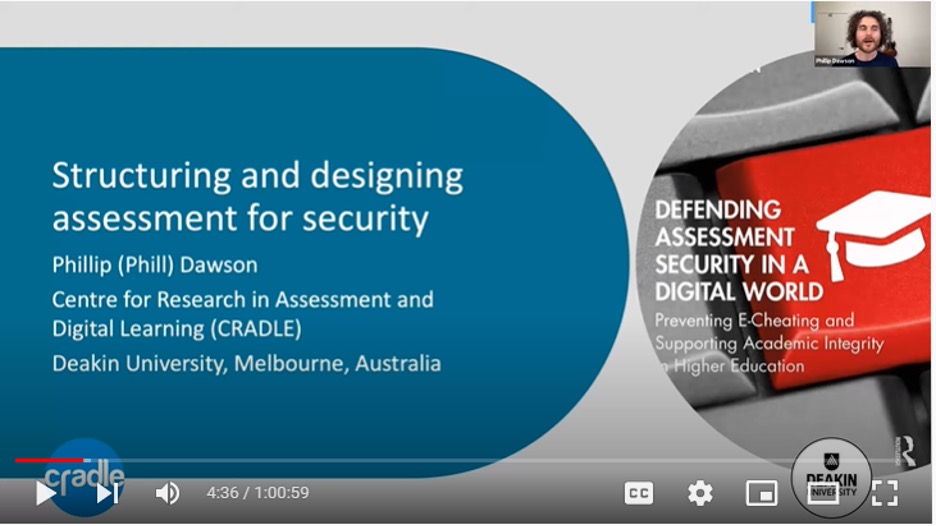Reflections on Philip Dawson’s webinar: “Structuring and Designing Assessment for Security”

Reflections on Philip Dawson’s webinar: “Structuring and Designing Assessment for Security”
by
Esra Gün Alayafi
IATEFL Testing, Evaluation and Assessment Special Interest Group (TEASIG) organized a webinar on October 27, 2021. Phillip Dawson, who is the Associate Director of the Centre for Research in Assessment and Digital Learning (CRADLE) at Deakin University, gave a presentation on “Structuring and Designing Assessment for Security''. The presentation specifically focused on what educators are doing to structure and design online assessment that intends to improve the detection or deterrence of cheating. Professor Dawson argued that addressing cheating will require an uneasy balance between positive 'academic integrity' and adversarial 'assessment security' approaches.
There are many ways to hack and cheat in online exams by using specialist cheating technologies. One example given by Professor Dawson from the post COVID-19 era whilst explaining how cheating is changing, was from an article written by Lancaster ad Cotarlan (2021) on how contract cheating takes place on a file sharing website called Chegg. Lancaster and Cotarlan (2021) compared the volume of requests made and answers supplied on this web site. When they compared the time period of April 2019 and August 2019 with the period of April 2019 and August 2021, they found out that student requests for five STEM subject areas increased by 196.25% .
Another study that was mentioned was about contract cheating. Students can outsource their assignments in a variety of ways, including websites that provide bespoke assignments and file-sharing websites. However, using such web sites is not the only way assignments or exams can be outsourced. In a survey Awry (2021) conducted with over 10,000 respondents, she found out that the respondents used informal methods of outsourcing much more frequently than formal methods of outsourcing. In other words, students generally preferred getting support from their family members and friends. That’s why she believes that the term “assignment outsourcing” is a broader concept that explains what has been happening among many higher education institutions and that while promoting ethics and integrity, such informal outsourcing behaviors should also be taken into consideration.
In order to balance academic integrity and assessment security, many institutions ask their students to sign honor codes. Professor Dawson explained that although signing an honor code is good practice, it does not completely solve the problem. He argued that many different measures need to be taken in order to minimize cheating attempts. To maintain a high level of academic integrity, different practices can be employed such as remote proctoring, using Turnitin, or restricting certain tools or resources etc. However, while doing so, it is also important to avoid ‘policing’ the students or ‘surveillance’. Therefore, the measures educators take should have a balance of academic integrity and assessment security.
The last part of Professor Dawson’s presentation focused on having a layered approach to stop cheating. The first important aspect is related to the reliability and validity of assessment. If the precautions educators take in order to avoid cheating make the exam less valid and/or less reliable, is the exam really worth securing? The basic tenets of assessment should not be neglected when making administrative and/or pedagogical changes. Another important aspect Professor Dawson explained was about some misconceptions about task design. For example, some educators believe that authentic assessments can effectively address contract cheating. However, according to a study carried out by Ellis et. al. (2020), this widespread belief is not completely accurate. In their study, Elis et. al. (2020) used a five-factor framework to rate the authenticity of assignments in two datasets: 221 assignment orders collected from academic custom writing websites and 198 assessment tasks where contract cheating had been detected. Upon their analysis, they concluded that in both of the datasets, the authenticity factors were also outsourced to third parties. Therefore, task design cannot be considered as the ultimate precaution in our current situation.
Similarly, authentic restrictions such as closed book tasks work well only if educators can ensure that all of the students have the same conditions wherever they are taking the exam or writing the assignment. Otherwise, we may be disadvantaging the students who follow the rules. The same applies to remote proctoring. Although there are concerns about privacy and surveillance, it is true that it deters cheating to an extent. However, if we can’t enforce the same rules to all the students, it is unfair to students who follow the rules.
Professor Dawson concluded his presentation by explaining that there are no easy solutions to this multi-layered issue. However, there are some ways to improve the current situation by providing education campaigns to students, improving detection rates through training, staffing and technology and ultimately by making it someone’s job. Even though it is time-consuming and tiring, when a team is responsible for detecting cheating, each case is taken seriously and followed-up.
The recording of this webinar can be accessed from the link below.
https://www.youtube.com/watch?v=aK5hN6-_v64
Awdry, R. (2021). Assignment outsourcing: moving beyond contract cheating. Assessment & Evaluation in Higher Education, 46:2, 220-235. https://doi.org/10.1080/02602938.2020.1765311
Ellis, C., van Haeringen,K., Harper, H., Bretag, T., Zucker,I., McBride, S., Rozenberg, P., Newton P.,
Saddiqui, S. (2020). Does authentic assessment assure academic integrity? Evidence from contract cheating data,.Higher Education Research & Development, 39:3, 454-469. https://doi.org/10.1080/07294360.2019.1680956
Lancaster, T., & Cotarlan, C. (2021). Contract cheating by STEM students through a file sharing website: a COVID-19 pandemic perspective. International Journal for Educational Integrity, 17 (1), 3. https://doi.org/10.1007/s40979-021-00070-0
